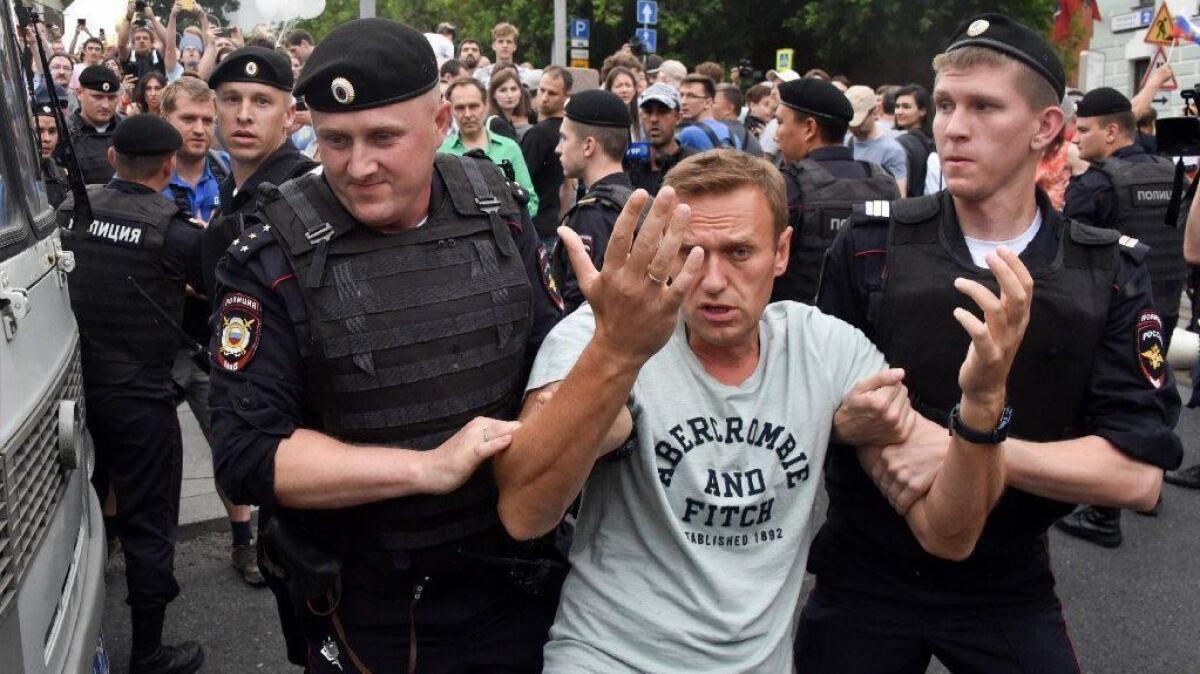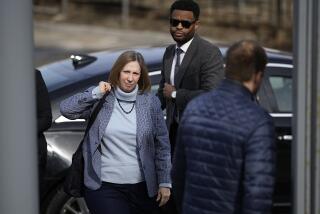Russia detains more than 400 in protests following journalist’s release

Russian police detained at least 400 people in central Moscow on Wednesday for taking part in a peaceful but unsanctioned demonstration protesting impunity and corruption in law enforcement agencies.
The protest came a day after police released prominent Russian investigative journalist Ivan Golunov, who had been arrested last week on drug-dealing charges that he said were fabricated by police in retaliation for his anti-corruption reports.
Golunov’s arrest sparked a wave of protests and demands for his release from celebrities, journalists and civil society members that lasted several days. Moscow’s police chief dismissed the case on Tuesday, citing a lack of evidence. The dismissal was unprecedented in recent Russian history.
Russia heeds protests and drops charges against anti-corruption reporter »
Police said at least 1,200 demonstrators participated in Wednesday’s march, which had been organized via social media by Golunov supporters before his release. The organizers decided to go forward with the protest even after the dismissal to pressure the government to punish those responsible for fabricating a case against one of the country’s leading investigative journalists.
Organizers said negotiations with the city government to get permission for the protest march had failed and cautioned that there could be detentions. Unsanctioned rallies in Russia frequently include harsh crackdowns by riot police.
Many participants said they turned out Wednesday despite the heavy police presence because they saw the case against Golunov as another example of abuse of power in Russia.
“What happened to Ivan could happen to anyone,” said Tatiana Malysheva, 40, a public relations manager from Moscow. “But this is also about a wider issue, about things that are happening all around Russia now.”
Malysheva said she had been watching the protests in other Russian cities against plans to build large landfills, particularly in the northern region of Arkhangelsk, where thousands have participated in a series of protests. In the Siberian city of Yekaterinburg, protests forced a local government to cancel plans to build a cathedral in a city park.
Yulia Gurova, 23, said she thinks Golunov’s case dismissal and the local demonstrations are small victories for Russia’s embattled civil society.
“Things are changing, but it’s still all about how much noise we can make,” she said. Gurova had come to the demonstration with two friends, one of whom was later detained by police. He had been standing talking to a former professor when two riot police grabbed him by the arms and hauled him into the police bus, she said.
Police detained hundreds, including some accredited journalists, as the march wound its way through Moscow’s historic center. Opposition leader Alexei Navalny, who has organized huge anti-corruption and anti-Putin protests in the past two years, was also detained.
March organizers planned to lead the crowd to the front of the central police building, where pickets against Golunov’s arrest had been taking place for several days before his release. Police blocked the road leading to the police headquarters. stopping the march, and began hauling away dozens of people in police vans.
“Ivan is free, but the story is not over,” said Tatyana Felgenhauer, a deputy editor of the Echo of Moscow radio station. Felgenhauer was stabbed in the neck by an assailant who broke into the radio station’s newsroom in 2017. She recovered but still bears a scar on her neck. Many argued that government disparagement of the media and a prevailing violent political climate motivated her attacker.
“Ivan’s case is just one example of the many cases of abuse of power that people are bothered about,” she said. “We are here to protest against the unfairness of the system.”
The march coincided with Russia Day, a national holiday to commemorate Russia’s independence from the former Soviet Union and some protesters carried Russian flags.
Twitter: @sabraayres
Ayres is a special correspondent.
More to Read
Start your day right
Sign up for Essential California for news, features and recommendations from the L.A. Times and beyond in your inbox six days a week.
You may occasionally receive promotional content from the Los Angeles Times.







